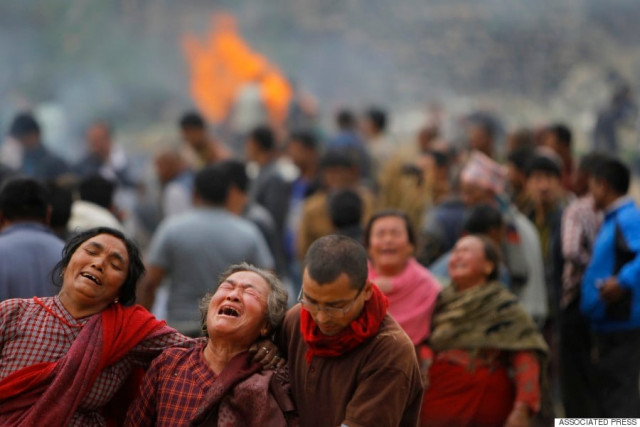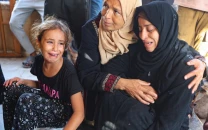Nepal marks one year since quake as frustration mounts
The 7.8-magnitude quake killed 9,000 people and some four million survivors are still living in temporary shelters

PHOTO: REUTERS
The 7.8-magnitude quake killed nearly 9,000 people and some four million survivors are still living in temporary shelters, according to the International Federation of Red Cross and Red Crescent Societies.
Pakistan, India may break the ice in Nepal
Prime Minister K.P. Sharma Oli laid flowers at a razed 19th-century tower in Kathmandu where hundreds gathered for a sombre service, after a minute's silence to remember those killed.
Buddhist monks in maroon robes held prayers at a site nearby that was home to a popular temple destroyed in the quake.
Trekking guide Govinda Timilsina said his life has been on hold since losing his home, as he waits for help and unable to rebuild himself because of the government's complex rules for qualifying for quake aid.
Nepal rendezvous: FO confirms Aziz will meet Sushma
"It became impossible to live in the village, we lost everything," Timilsina, 28, said of having to relocate his mother, wife and three-year-old son from hard-hit Dhading district.
"The government rules were so confusing, we were scared we would not get compensation if we started work on our own," said Timilsina, who rents a single room in Kathmandu for his family.
Although international donors pledged $4.1 billion to aid Nepal's recovery, political wrangling over control of the funds means most victims have received nothing beyond an initial small payout.
Following a hailstorm of criticism, the government has vowed to kickstart reconstruction of schools and hospitals, and speed up handing out the first $500 instalment of a $2,000 payout promised to homeless survivors.
But in the capital on Sunday, about 20 people dressed in black protested against the government's response to the tragedy, chanting "politicians in palaces, public in tents" and "what happened to reconstruction?"
The disaster reduced more than a hundred monuments to rubble and damaged another 560 structures, including many centuries-old temples and stunning royal palaces in the Kathmandu valley that used to attract visitors from around the world.
In the historic town of Bhaktapur, many of the traditional brick houses that made it famous have been replaced by grey tents and rusty tin shacks where women like Laxmi Nyapit are now forced to raise their children.
"Unless we get help, I don't know how we will ever live in a house again," the mother-of-three told AFP sitting in her tent, which houses a bed and a stove.
Kathmandu conference: Mehmood Mandviwalla elected SAARCLAW president
Nyapit, who has received just $150 from the government, said memorials -- including candlelight vigils planned for later Sunday -- meant little.
"They have to remember those who died, but first they have to remember us survivors and come here to help us," said the 40-year-old, who earns 35 rupees (32 US cents) a day for knitting gloves.
"If our government cared, we would not be living like this after a year."
The disaster struck on April 25 but commemorations were being held on Sunday -- the quake anniversary according to the Nepali calendar.
The quake wrecked infrastructure across the hardest-hit regions of Nepal, damaging more than 1,200 health centres and severing a lifeline for remote, rural communities.
Nearly 8,000 schools were destroyed or left unsafe, leaving almost one million children without classrooms.
Tired of waiting, some 110,000 families have moved back into homes that remain at risk of collapse. More than 31,000 victims have also rebuilt their own houses, taking out loans or turning to charities for help.
On top of the financial losses, pegged at $7 billion, the disaster also delivered a severe blow to Nepal's already weak economy.
Growth is now expected to reach just 1.5 percent over the financial year ending in July 2016 -- the lowest level since 2007 -- according to the Asian Development Bank.



















COMMENTS
Comments are moderated and generally will be posted if they are on-topic and not abusive.
For more information, please see our Comments FAQ